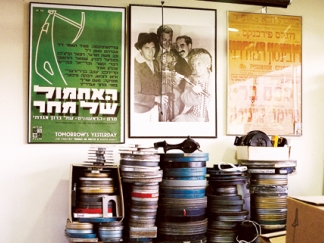Description from TIFF 2009 catalog by Thom Powers:
In recent years, Israeli cinema has risen to prominence through acclaimed films such as The Band’s Visit, Jellyfish and Waltz with Bashir. The diversity of output defies generalization, but two characteristics are prevalent: a soul-searching over the country’s problems and a penchant for comic relief. A History of Israeli Cinema helps us to better understand the complex background of this vital movement. Its epic length is earned by having a lot to say. The documentary’s two halves are as distinct from each other as the historical periods they represent. Each part can be viewed independently, but a taste of one will surely give you the appetite for the other.
If you don’t know much about Israeli cinema, you needn’t worry. Director Rapha&”235;l Nadjari has crafted this work for both outsiders and insiders. He serves up generous excerpts of Israeli films, contextualized by insightful commentary from filmmakers, scholars and critics. While following the country’s cinema, we simultaneously learn about Israel’s political and social history. The interviewees discuss not only what the cinema recorded, but also what it left out.
Part 1 spans the years 1933 to 1978, covering the Zionist struggles to form a state, expand its boundaries and shape its identity. Early films of the thirties shared the propagandistic qualities of revolutionary cinema, celebrating the land then known as Palestine. In Avodah, Helmar Lerski’s 1935 documentary, the utopian imagery verges on the erotic in a scene where a Zionist male drills a well for a young woman to drink. After the Second World War, the iconography of the pioneer gave way to the fighter. Paul Newman’s starring role in Otto Preminger’s 1960 epic, Exodus, raised enormous international sympathy and spurred donations for Israel. The garrulous producer Menahem Golan describes how he moved past message films to entertainment in titles such as Ephraim Kishon’s 1964 comedy Sallah Shabati, about a newly arrived Sephardic immigrant.
Israelis are never short on opinions, so a synopsis can’t begin to describe all the ideas contained in this history. They spill out like fruit from a cornucopia, some bitter, some sweet.
About the director:
Rapha&”235;l Nadjari was born in Marseille, France, and now lives in Israel. He began his career in French television before turning to cinema. He has written and directed the features The Shade (99), I Am Josh Polonski’s Brother (01), Apartment “5c (02), Avanim (04), which won the Prix France Culture (Cin&”233;ma) for French filmmaker of the year at the Cannes Film Festival, and Tehilim (07). A History of Israeli Cinema (09) is his first feature documentary.






